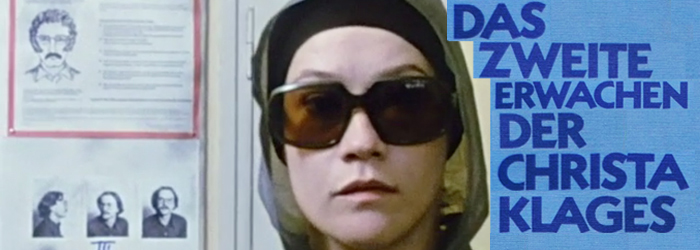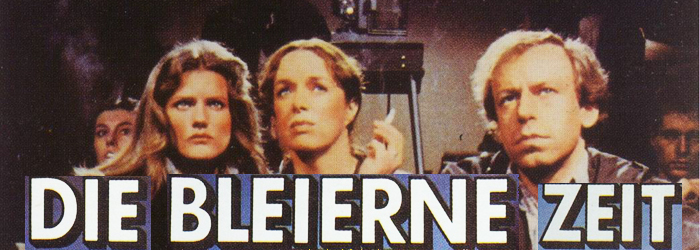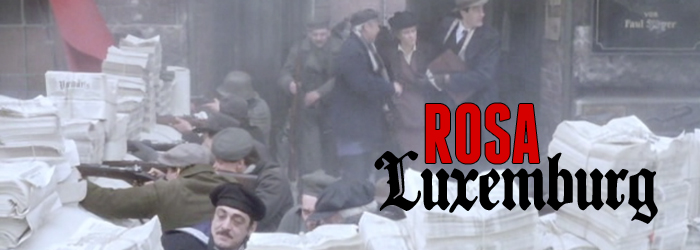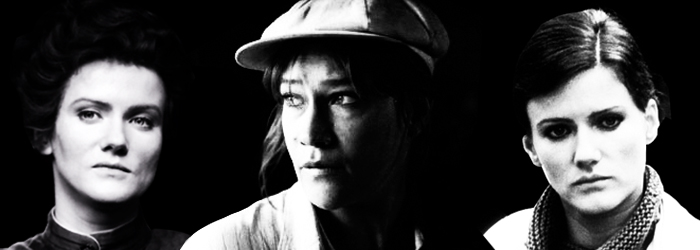Margarethe von Trotta’s last two films, VISION: FROM THE LIFE OF HILDEGARD VON BINGEN from 2010 and HANNAH ARENDT, released earlier this year, are both portraits of contemplative women. In contrast, this set of three films from the first decade of her career deals with praxis, and courageous women who make the leap to it.
All made in the wake of the revolutionary violence that followed the splintering of the student movement and the extraparliamentary opposition in Germany in the late 1960s, these films represent three different approaches to an analysis of the possibilities this violence opened up and those that it closed off.
They all have a factual basis: THE SECOND AWAKENING OF CHRISTA KLAGES was inspired by the case of a Munich kindergarten teacher who robbed a bank to save her daycare center from debt, and whose 1975 trial a protesting von Trotta was arrested at. THE GERMAN SISTERS, a thinly veiled account of RAF-member Gudrun Ensslin’s relationship with her reformist sister, offers a stark portrayal of Ensslin’s experience in a maximum security prison and her sister’s quest to prove that her controversial death could not have been a suicide. Finally, ROSA LUXEMBURG recounts the life of the fiery orator and revolutionary, her disappointment with the German Socialist Party’s opportunism during the war, her work with Karl Liebknecht leading up to the Spartacist uprising, and her brutal murder during its bloody suppression in 1919.
More than simple attempts to reclaim maligned or abused historical figures, these films can be seen as examinations of the systemic violence embodied in institutions like marriage, rent, legislative bodies, and prisons, and of the more or less revolutionary responses it can prompt.
 THE SECOND AWAKENING OF CHRISTA KLAGES
THE SECOND AWAKENING OF CHRISTA KLAGES
a.k.a. Das zweite Erwachen der Christa Klages
Dir. Margarethe von Trotta, 1978
West Germany, 89 mins.
In German with English subtitles.
SATURDAY, NOVEMBER 2 – 10:00 PM
MONDAY, NOVEMBER 25 – 7:30 PM
To save her kindergarten from being replaced with a strip club, Christa Klages grabs the rentier-bull by the money-horns, acknowledging that real justice is something to be wrested from a reluctant society by force. Let down by a mild, too-honest protestant priest, whose sermon about martyrdom in Brecht’s Mother Courage underlines his own cowardliness, and shadowed by a resentful bank clerk whose smug volunteer police work infuriates the viewer at every turn, Christa finally finds solidarity and tenderness in a forgotten childhood friendship.
THE SECOND AWAKENING is Von Trotta’s first solo film, having collaborated with Volker Schlöndorff on THE LOST HONOR OF KATHARINA BLUM in 1975 and COUP DE GRÂCE in 1976.
Special thanks to MKS Video.
 THE GERMAN SISTERS
THE GERMAN SISTERS
a.k.a. Die bleierne Zeit, Marianne and Juliane
Dir. Margarethe von Trotta, 1981
West Germany, 102 mins.
In German with English subtitles.
SUNDAY, NOVEMBER 10 – 5:00 PM
SATURDAY, NOVEMBER 16 – 7:30 PM
DIE BLEIERNE ZEIT gets its title from a poem by Hölderlin and conjures the oppressive atmosphere of postwar Germany, with the bleak and aimless consumer society being built through the “economic miracle” and the heritage of fascism that the majority of Germans were reluctant to address. Its Italian title, ANNI DI PIOMBO, became the phrase used to describe the wave of revolutionary violence and ensuing repression in Italy in the 70s. The overcast skies and modern prison blocks, along with the black and white newsreels of extermination camps and third-world misery that radicalize the Ensslin sisters, make for an overall cinematic texture that is just as leaden as the title promises.
 ROSA LUXEMBURG
ROSA LUXEMBURG
a.k.a. Die Geduld der Rosa Luxemburg
Dir. Margarethe von Trotta, 1986
West Germany, 120 mins.
In German with English subtitles.
WEDNESDAY, NOVEMBER 6 – 7:30 PM
SUNDAY, NOVEMBER 17 – 7:30 PM
It seems to me that this whole madhouse, this moral mire in which we now crawl, can in an instant, as if by magic, be changed into something great.
Almost thirty years before von Trotta cast Barbara Sukowa as famed political philosopher Hannah Arendt, the two of them gave cinematic expression to the life of a revolutionary theorist more impatient to grasp the reins of the historical process. Sukowa’s portrayal of “Red Rosa” is fiery and rousing, and her exhortations for the proletariat to smash the bourgeois order are so emphatic that the crowd should immediately file out of the cinema and do it.
Luxemburg has been invoked as a hero and martyr by many institutional forms of the German left, including the East German Socialist Unity Party and the present-day parliamentary party Die Linke. However, Luxemburg was critical of participation in any form of bourgeois democracy, and her intransigence is underscored in von Trotta’s film.

